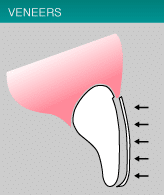What type of veneers are right for you?
11 Mar 2021If you are motivated to improve your smile, dental veneers can provide an exciting and simple solution.
Made from a variety of different materials, veneers are essentially thin coverings that are placed over the front (visible) part of the tooth and can be used to correct a wide range of dental issues including teeth that are stained, chipped or worn, crooked or misshapen as well as uneven spaces or gaps between the teeth.
Veneers are most commonly made of either porcelain or composite resin materials. Your dentist will help you to choose the material that is best for you as each type of veneer has its own benefits.
Porcelain Veneers
Porcelain veneers are thin shells that are typically hand-crafted by a dental technician to create the colour, shape and size for your teeth in order to enhance your smile.

They are extremely strong and long-lasting, stain resistant and have a natural-looking surface that is able to reflect the translucencies of natural teeth in order to give you a perfect looking smile.
Preparation of the underlying tooth enamel is sometimes required but is significantly more conservative when compared with other procedures such as crowns.
The process can take up to two weeks and involves a number of necessary steps which include pre-treatment consultation and smile design to allow for more predictable outcomes in line with your expectations.
Through the process you will have temporary veneers to wear which will give you a preview of how the final teeth will look upon completion. At the final visit, the temporaries are removed and the dentist places the veneers on the teeth to check the fit and the aesthetics. After any adjustments and once you have approved your new smile, the veneers are permanently bonded to the tooth using a dental cement.
Resin Veneers
A composite resin veneer is made from a tooth-coloured filling material bonded directly to the tooth surface. There are several benefits that resin veneers have including less tooth enamel removal, lower costs than porcelain veneers and typically less visits to the surgery. They are easy to fix if they get damaged, although composite veneers are generally not as strong or wear-resistant as porcelain veneers. In placement of resin veneers the teeth are prepared or reshaped, and the dentist carefully bonds and sculpts the composite material using a colour that is best suited to your smile. A special light is used to cure the composite and bond it to your teeth. The veneers are smoothed and polished to look as natural as possible.
There are many factors to consider when choosing to have treatment with veneers including what outcome you are trying to achieve, how many teeth will need to be treated in order to achieve it, what your budget is as well as the existing condition of your teeth.
At Bond Street we welcome you to meet with one of our highly experienced clinicians with special interests in cosmetic dentistry to learn more and to determine whether veneers are a suitable treatment option to enhance your smile.
Veneers Back to Articles